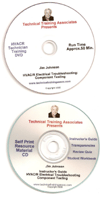There is no question that ongoing training is needed in the HVACR industry. The real question may be: How qualified are those doing the training? RSES has proposed an answer through the development of its RSES Certified Trainer (RCT) program.
RSES Certified Trainer Program
Those involved in, or those interested in, providing ongoing industry training are encouraged to submit information to the RCT program, where a committee of industry professionals will review their qualifications.
Additionally, RSES is also looking for areas interested in offering ongoing training. These target areas could range from RSES-sponsored seminars to businesses seeking ways to provide additional technical education.
RSES staff noted that RCT is a voluntary effort; but added that the reach of RSES through its member chapters and international scope could help bridge the gap that sometimes arises between prospective trainers and institutions in need of instruction.
“We have some very good trainers in our organization,” said Jean Birch, manager of conferences and seminars, RSES, who is heavily involved with the RCT program. “The question was, ‘How do we learn more about these trainers and let people know we have them?’”
Roger Hensley, chairman, education and examining board, RSES, said the concept had been talked about within the society, and that “it was one of those things that just took off.”
The project reached fruition in November 2012, at the RSES International Conference in Isles of Palms, S.C., where detailed requirements and guidelines were provided to all attendees.
The guidelines described the program accordingly: “The goal of the RSES Certified Trainer program is to make quality HVACR instruction widely available to those working or conducting business in the industry.” The guidelines noted that RSES is interested in placing instructors in “businesses, schools, wholesalers, distributors, and organizations within the HVACR field.”
According to Hensley, RCT is a way for qualified instructors “to be able to say that an international organization has extended to them certification.”
Birch noted that the program is primarily geared for instruction beyond colleges and vocational schools, where academic requirements of faculty are more clearly defined. The program assists instructors in spelling out their areas of expertise, granting a clearer vision of each educator’s skills. The program also recognizes that no one instructor should be expected to know and teach the entire range of the HVACR industry to those who have already completed more formal academic studies. Birch said, of all HVACR fields, controls and electrical instruction are the most requested.
Prerequisites
RSES’ Education and Examining board members will review resumes, experience, and related items for each RCT applicant. In addition, board members noted they would consider how an instructor utilizes lesson plans, establishes and maintains a good learning environment, effectively delivers a training message, and provides a measurement of student learning.
Applicants should be RSES Certificate Members, Specialist Members, or Certificate Member Specialists, prior to participation. Certifications are earned after completing RSES exams within each category.
It is also encouraged that applicants complete RSES’ Training the Trainer course.
Rick Hoke, an RSES regional director, education and examining board member, and 2012 RSES Speaker of the Year award winner, participated in a Train the Trainer course during the society’s 2012 International Conference. He said the attendees learned methods of training, presentation styles, and evaluations during the event. Each participant performed demonstration lessons and received constructive criticism following their performances, he said.
Birch said the marketing side includes RSES promoting the availability of certified trainers. She said RSES enters into pay and travel expense negotiations with those seeking an RCT instructor. Geographical proximity plays a factor in who is chosen, and when, she said.
RCT participants must renew their credentials every three years. Instructors would have access to training materials offered through RSES as well as other sources in the industry. Hensley said the program is scheduled to launch in the first quarter of 2013.
Publication date: 1/28/2013







